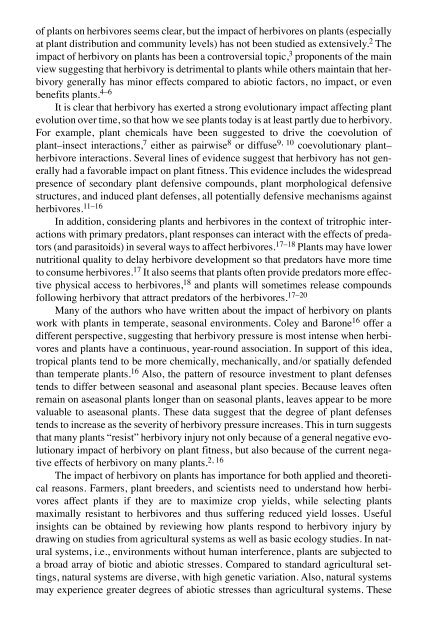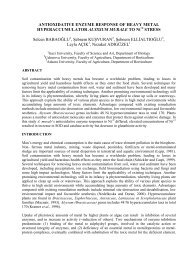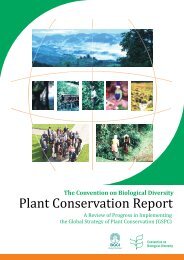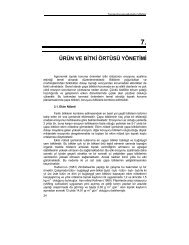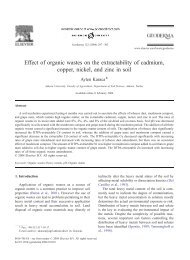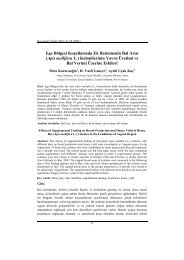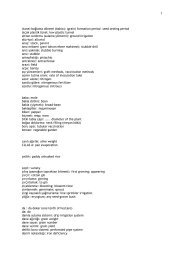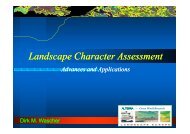Biotic Stress and Yield Loss
Biotic Stress and Yield Loss
Biotic Stress and Yield Loss
- No tags were found...
You also want an ePaper? Increase the reach of your titles
YUMPU automatically turns print PDFs into web optimized ePapers that Google loves.
of plants on herbivores seems clear, but the impact of herbivores on plants (especiallyat plant distribution <strong>and</strong> community levels) has not been studied as extensively. 2 Theimpact of herbivory on plants has been a controversial topic, 3 proponents of the mainview suggesting that herbivory is detrimental to plants while others maintain that herbivorygenerally has minor effects compared to abiotic factors, no impact, or evenbenefits plants. 4–6It is clear that herbivory has exerted a strong evolutionary impact affecting plantevolution over time, so that how we see plants today is at least partly due to herbivory.For example, plant chemicals have been suggested to drive the coevolution ofplant–insect interactions, 7 either as pairwise 8 or diffuse 9, 10 coevolutionary plant–herbivore interactions. Several lines of evidence suggest that herbivory has not generallyhad a favorable impact on plant fitness. This evidence includes the widespreadpresence of secondary plant defensive compounds, plant morphological defensivestructures, <strong>and</strong> induced plant defenses, all potentially defensive mechanisms againstherbivores. 11–16In addition, considering plants <strong>and</strong> herbivores in the context of tritrophic interactionswith primary predators, plant responses can interact with the effects of predators(<strong>and</strong> parasitoids) in several ways to affect herbivores. 17–18 Plants may have lowernutritional quality to delay herbivore development so that predators have more timeto consume herbivores. 17 It also seems that plants often provide predators more effectivephysical access to herbivores, 18 <strong>and</strong> plants will sometimes release compoundsfollowing herbivory that attract predators of the herbivores. 17–20Many of the authors who have written about the impact of herbivory on plantswork with plants in temperate, seasonal environments. Coley <strong>and</strong> Barone 16 offer adifferent perspective, suggesting that herbivory pressure is most intense when herbivores<strong>and</strong> plants have a continuous, year-round association. In support of this idea,tropical plants tend to be more chemically, mechanically, <strong>and</strong>/or spatially defendedthan temperate plants. 16 Also, the pattern of resource investment to plant defensestends to differ between seasonal <strong>and</strong> aseasonal plant species. Because leaves oftenremain on aseasonal plants longer than on seasonal plants, leaves appear to be morevaluable to aseasonal plants. These data suggest that the degree of plant defensestends to increase as the severity of herbivory pressure increases. This in turn suggeststhat many plants “resist” herbivory injury not only because of a general negative evolutionaryimpact of herbivory on plant fitness, but also because of the current negativeeffects of herbivory on many plants.2, 16The impact of herbivory on plants has importance for both applied <strong>and</strong> theoreticalreasons. Farmers, plant breeders, <strong>and</strong> scientists need to underst<strong>and</strong> how herbivoresaffect plants if they are to maximize crop yields, while selecting plantsmaximally resistant to herbivores <strong>and</strong> thus suffering reduced yield losses. Usefulinsights can be obtained by reviewing how plants respond to herbivory injury bydrawing on studies from agricultural systems as well as basic ecology studies. In naturalsystems, i.e., environments without human interference, plants are subjected toa broad array of biotic <strong>and</strong> abiotic stresses. Compared to st<strong>and</strong>ard agricultural settings,natural systems are diverse, with high genetic variation. Also, natural systemsmay experience greater degrees of abiotic stresses than agricultural systems. These


